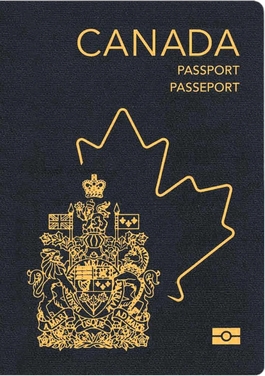Immigration, Refugees and Citizenship Canada is the department of the Government of Canada with responsibility for matters dealing with immigration to Canada, refugees, and Canadian citizenship. The department was established in 1994 following a reorganization.

Canadian nationality law details the conditions by which a person is a national of Canada. The primary law governing these regulations is the Citizenship Act, which came into force on February 15, 1977 and is applicable to all provinces and territories of Canada.

The Immigration and Refugee Board of Canada, established in 1989 by an Act of Parliament, is an independent administrative tribunal that is responsible for making decisions on immigration and refugee matters. As one of their responsibilities, the IRB decides on applications for refugee protection made by individuals. The IRB reports to Parliament through the Minister of Immigration, Refugees and Citizenship (IRCC), but remains independent from both the IRCC and the Minister.

The Oath of Citizenship, or Citizenship Oath, is a statement recited and signed by those who apply to become citizens of Canada. Administered at a ceremony presided over by a designated official, the oath is a promise or declaration of fealty to the Canadian monarch and a promise to abide by Canada's laws and uphold the duties of a Canadian citizen; upon signing the oath, citizenship is granted to the applicant.

The Oath of Allegiance of the United States is the official oath of allegiance that must be taken and subscribed by every immigrant who wishes to become a United States citizen.

The Immigration and Refugee Protection Act (IRPA) is an Act of the Parliament of Canada, administered by Immigration, Refugees and Citizenship Canada (IRCC) and Canada Border Services Agency (CBSA), that replaced the Immigration Act, 1976 in 2002 as the primary federal legislation regulating immigration to Canada. The "Immigration and Refugee Protection Regulations" (IRPR) specify how provisions of IRPA are to be applied.

The Permanent Resident card also known colloquially as the PR Card or the Maple Leaf card, is an identification document and a travel document for permanent residents of Canada. It is one of the methods by which Canadian permanent residents can prove their status and is, along with the permanent resident travel document (PRTD), one of the only documents that allow permanent residents to return to Canada by a commercial carrier.

A Canadian passport is the passport issued to citizens of Canada. It enables the bearer to enter or re-enter Canada freely; travel to and from other countries in accordance with visa requirements; facilitates the process of securing assistance from Canadian consular officials abroad, if necessary; and requests protection for the bearer while abroad.

According to the 2021 Canadian census, immigrants in Canada number 8.3 million persons and make up approximately 23 percent of Canada's total population. This represents the eighth-largest immigrant population in the world, while the proportion represents one of the highest ratios for industrialized Western countries.

Canadian immigration and refugee law concerns the area of law related to the admission of foreign nationals into Canada, their rights and responsibilities once admitted, and the conditions of their removal. The primary law on these matters is in the Immigration and Refugee Protection Act, whose goals include economic growth, family reunification, and compliance with humanitarian treaties.

Argentine passport are issued to citizens of Argentina by the National Registry for People (ReNaPer). They were issued exclusively by the Argentine Federal Police up to 2011. Their primary use is to facilitate international travel.

The Canadian Citizenship Test is a test, administered by the department of Immigration, Refugees and Citizenship, that is required for all applicants for Canadian citizenship who are aged between 18 and 54 and who meet the basic requirements for citizenship. The test is available in both French and English, the official languages of Canada. The test is usually written, but in some cases it might be oral and take place in the form of an interview with a citizenship officer. The Department of Immigration, Refugees and Citizenship decides if the applicant's test is written or oral, depending on their various criteria. In the aftermath of COVID-19, the test has been moved online.

Bhutanese nationality law is the law governing the acquisition, transmission and loss of Bhutanese citizenship. The Bhutanese Citizenship Act of 1985 was introduced by the Druk Gyalpo Jigme Singye Wangchuck, on June 10, 1985, modifying the definition of a Bhutanese citizen. The Act was implemented as part of a new national policy of Driglam Namzha, national customs and etiquette. Because of its emphasis on Bhutanese culture, the Act is also referred to as the "One Nation, One People Act." The 1985 Act was amended by the Immigration Act of 2007 and then superseded in 2008 by the Constitution of Bhutan insofar as previous laws are inconsistent; where not inconsistent, the provisions of the 2007 Act, the 1985 Act, and previous Acts relating to immigration continue in effect.

The visa policy of Canada requires that any foreign citizen wishing to enter Canada must obtain a temporary resident visa from one of the Canadian diplomatic missions unless they hold a passport issued by one of the 53 eligible visa-exempt countries and territories or proof of permanent residence in Canada or the United States.

The Nationality, Immigration and Asylum Act 2002 is an Act of the Parliament of the United Kingdom. It received royal assent on 7 November 2002.
The Canadian English Language Proficiency Index Program, or CELPIP, is an English language assessment tool which measures listening, reading, writing, and speaking skills. The test is administered by Paragon Testing Enterprises., a subsidiary of the University of British Columbia (UBC). Paragon is the only Canadian company delivering Immigration, Refugees and Citizenship Canada (IRCC) designated English proficiency tests. The CELPIP test is offered in two versions, CELPIP-General, and CELPIP-General LS.
The Standing Committee on Citizenship and Immigration (CIMM) is a standing committee of the Canadian House of Commons that studies issues related to citizenship and immigration in Canada.

Plaintiff M70 is a decision by the High Court of Australia. The lawsuit concerned an injunction sought by multiple Afghan asylum seekers against immigration minister Chris Bowen. The injunction was to prevent Bowen from deporting the plaintiffs to Malaysia, pursuant to s198A of the Migration Act. The purpose of the deportation was to avoid their asylum application from being assessed by Australia.
Zunera Ishaq is a Canadian Muslim woman living in Mississauga, Ontario, Canada, who was at the centre of a debate about the right to wear a niqāb— a veil that covers most of the face—when taking the Oath of Citizenship at a public citizenship ceremony administered under the Citizenship Act, RSC 1985, c C-29, which became a point of controversy during the 2015 Canadian federal elections.

Express Entry is a system used by the Canadian government to manage Canadian permanent residence applications for filling labour gaps through certain economic immigration programs. Launched on 1 January 2015, this immigration system is used to select and communicate with skilled and qualified applicants, it also manages a pool of immigration ready skilled workers. Express Entry is designed to facilitate express immigration of skilled workers to Canada "who are most likely to succeed economically." The system is identified to be efficient in processing times, with 80% of applications processed in 6 months or less compared to an existing one.







